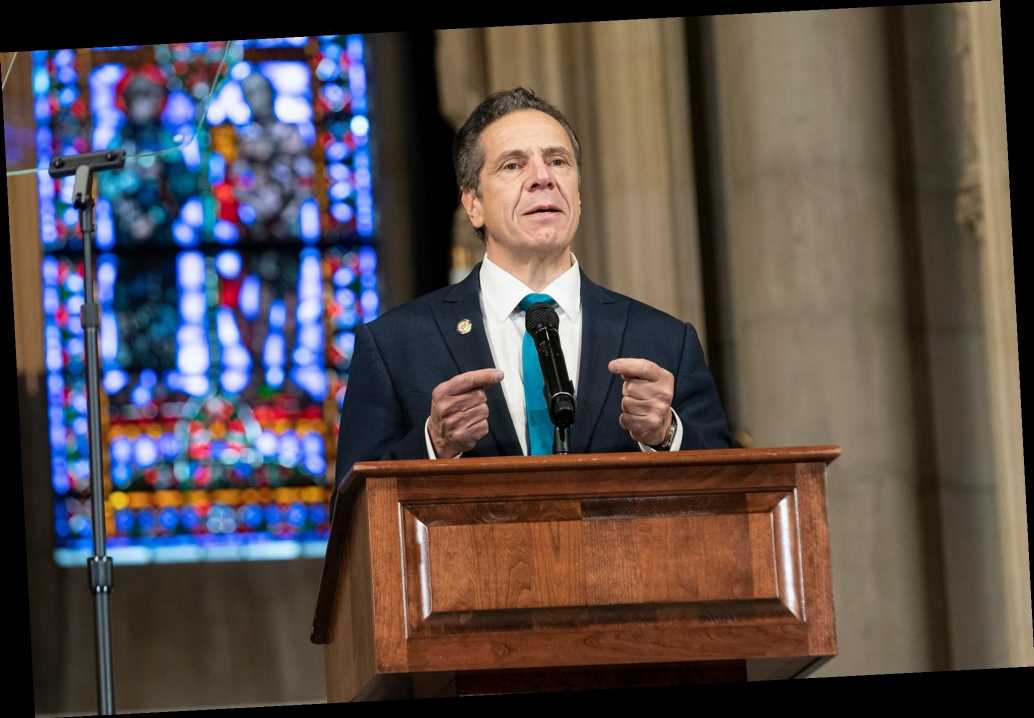The Supreme Court’s order temporarily blocking New York from setting coronavirus capacity limits at houses of worship is “irrelevant” and “moot,” Gov. Andrew Cuomo claimed Thursday.
In the 5-4 decision, the court sided with the Roman Catholic Diocese of Brooklyn and Orthodox Jewish synagogues, who sued Cuomo over his restrictions on congregating in state-designated coronavirus hot spots, saying his actions trampled on religious freedom.
Cuomo, in a Thanksgiving Day conference call with reporters, insisted the order was moot because the houses of worship in question in the curt battle are no longer in designated red and orange zones in Brooklyn in Queens so the restrictions no longer apply to them.
The safety restriction to tame the pandemic imposed attendance caps at houses of worship from 10 to 25 people, respectively. The plaintiffs argued that the restrictions violated their religious freedoms under the First Amendment and unfairly targeted them while businesses deemed essential, including groceries and takeout restaurants, were allowed to operate.
“The Supreme Court made a ruling. It’s more illustrative of the Supreme Court than anything else,” Cuomo said, noting the court’s new conservative bent with the addition of Justice Amy Coney Barrett by President Trump.
“It’s irrelevant of any practical impact because of the zone they were talking about is moot. It expired last week,” the governor said, adding, “It doesn’t have any practical effect.”
“The lawsuit was about the Brooklyn zone. The Brooklyn zone no longer exists as a red zone. That’s muted. So that restriction is no longer in effect. That situation just doesn’t exist because those restrictions are gone.”
The governor’s legal adviser Beth Garvey, said houses of worship are now governed by less restrictive 50 percent capacity limits.
In its decision, the nation’s highest court said its decision temporarily blocking Cuomo’s executive order on the 10- and 25-person occupancy limits remains in effect pending further deliberation in the US Court of Appeals for the Second Circuit. They acknowledged the order narrowly addressed the zones in question, which are outdated.
Still in the larger context, the five justices in the majority warned they won’t tolerate violations of the First Amendment right to religious freedom — telegraphing what they might do on broader cases involving statewide restrictions on houses of worship, for example.
“Members of this Court are not public health experts, and we should respect the judgment of those with special expertise and responsibility in this area. But even in a pandemic, the Constitution cannot be put away and forgotten,” the judges said.
“The restrictions at issue here, by effectively barring many from attending religious services, strike at the very heart of the First Amendment’s guarantee of religious liberty.
“There can be no question that the challenged restrictions, if enforced, will cause irreparable harm…. If only 10 people are admitted to each service, the great majority of those who wish to attend Mass on Sunday or services in a synagogue on Shabbat will be barred.”
The justices noted that while worshippers can watch services on television or remotely, it’s not the same as personal attendance. Catholics who watch a Mass at home cannot receive communion and there are important religious traditions in the Orthodox Jewish faith that require personal attendance, the majority said.
Critics of Cuomo’s pandemic restriction hailed the order as a victory for religious freedom.
“Power-hungry Democrats like Cuomo have used the pandemic as an excuse to target people of faith with radical restrictions. It has no basis in science, and the Supreme Court agrees,” said House Republican Leader Kevin McCarthy.
“This is a win for religious liberty, and a reason to be thankful today!”
Said Staten Island Congresswoman-elect Nicole Malliotakis, “Last night’s Supreme Court decision is a victory for religious institutions, their congregations and all freedom-loving Americans.
“Governor Cuomo’s arbitrary restrictions not only infringed on our First Amendment rights but did not take into account building capacity or safety protocols put in place. It is fitting that the Court’s decision was made on the eve of Thanksgiving, a holiday founded by Pilgrims who settled in North America in search of religious freedom. New Yorkers and all Americans have one more thing to be thankful for today.”
Brooklyn Councilman Kalman Yeger (D-Borough Park) responded in a tweet, “Thanks to @AgudahNews & @BrooklynDiocese for fighting this important battle! On this #ThanksgivingDay, I’m thankful that the U.S. Constitution still protects New Yorkers.”
Share this article:
Source: Read Full Article

